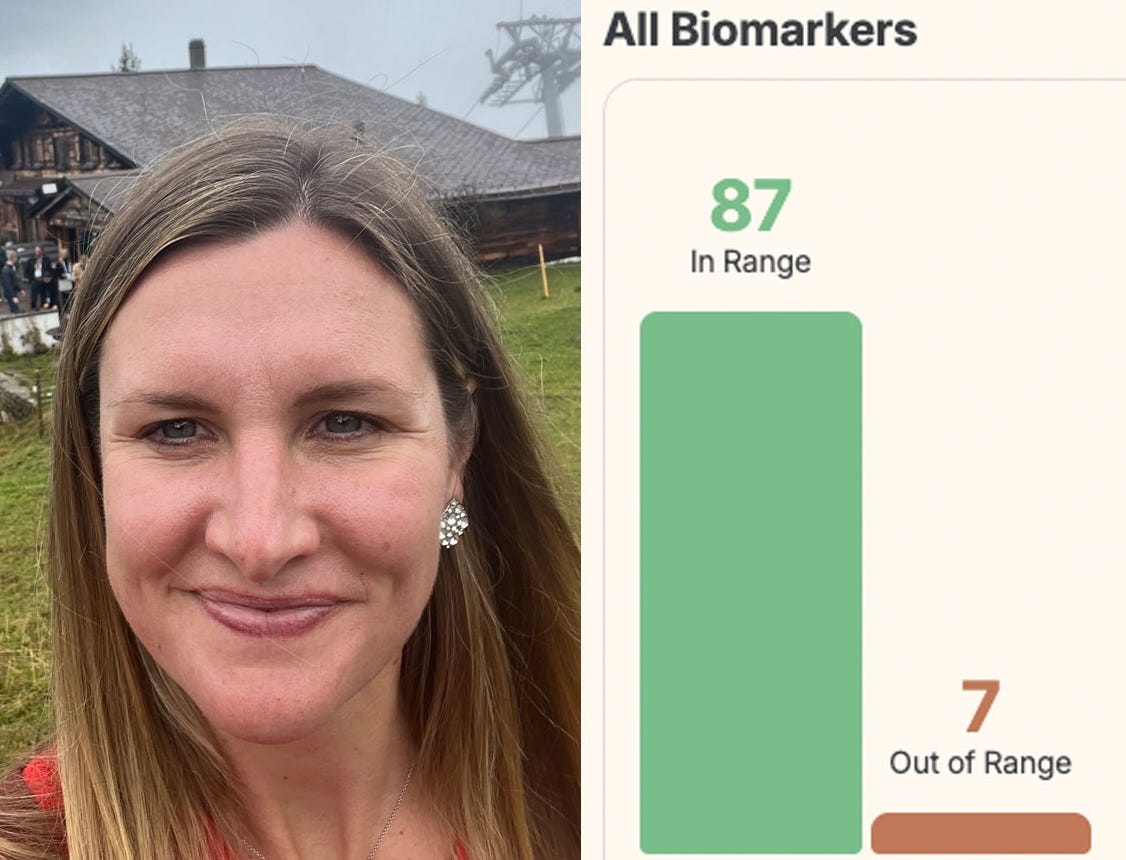
Hilary Brueck, Function Health
The Rock loves it, Zac Efron invests in it, and Equinox gym members are signing up for it in droves. Function Health is the latest hot commodity for longevity seekers looking to optimize their health.
The promise is simple: skip the waiting room at the doctor’s office and head straight to the lab, for comprehensive medical testing that evaluates the health of key organs, like your heart and kidneys.
Function also measures some things that “regular” doctors typically don’t, like electrolyte levels as well as the so-called “heavy metals” — lead, mercury — potentially poisonous substances that can sometimes lurk in our air, water, and food. It might even find cancer.
I wanted to see what all the big buzz was about with this $500 annual blood-and-pee testing service, so I tried it out. Disclaimer: I didn’t have to pay for it, because Function Health gave out free trials to journalists as the company is still in beta testing mode.
In the end, my Function results led me to seek out more advice from doctors than I usually would, to help me separate the signal from the noise in all the data.
I freaked out about all the little cholesterol particles hiding out in my blood

Chinnapong/Getty Images
The good news is that Function is not a huge time suck. It takes about 15 minutes to get the initial testing done and you can roll up to just about any Quest Diagnostics lab location nationwide (except in Hawaii and Rhode Island).
Their tests measure over 90 different biomarkers in your blood and urine, including almost all the typical stuff you’d find in a doctor’s office (except STD testing). Function performed roughly three times the number of tests I had done the last time I went to the doctor’s office for routine bloodwork. There were more measurements related to hormones, key nutrients, my metabolism, and heart health. Function Health also measured my “biological age,” a scientifically squishy indicator of health and fitness.
With so many tests being run, there’s a good chance that something you measure when you do Function will come back abnormal. That doesn’t always mean there’s something wrong with you; sometimes your own “normal” doesn’t fit neatly into a given reference range.
Function is OK with having a few errant flags in the data, and encourages re-testing any out of range labs. Their ethos is the more information, the better. It’s about creating a more detailed picture of your overall health, not making sure each test is perfect every time.
People are “wanting to know more about their biology, and to be advocates for their own health,” Dr. Mark Hyman, one of the founders of Function Health, told Business Insider.

Getty Images
Hyman, a longtime friend of US Health and Human Services Secretary Robert F. Kennedy Jr., chalks it up “to disillusionment with healthcare in general” in the US. Hyman says many people who use Function’s tests may be able to resolve their own health concerns without ever seeing a doctor afterwards.
“While you’ll need to see a doctor for certain things, the beauty of Function is you come in, follow up, order follow up tests on yourself, and then you can follow the guidance,” Hyman said.
His venture dovetails with the rise of new tech promising to put you in the driver’s seat of your own health. Think wearables (rings, watches, glucose monitors) and concierge medicine (full body MRIs, anti-aging IV drips). As the personalized medicine industry booms, Function is taking off. The company says its membership has more than doubled since December, to more than 200,000 customers.
I ended up overanalyzing my results, and coming to some pretty silly conclusions
The very first “out of range” marker that was mentioned in my Function report was a cholesterol measurement. While my regular LDL, or “bad” cholesterol number — the one you’d get measured in a doctor’s office — looked fine, Function also measured the size of my LDL cholesterol particles.
Apparently, I had slightly elevated numbers of small and medium sized LDL cholesterol particles, which are more dangerous than larger LDL particles. This “could indicate an increased risk for cardiovascular disease despite normal LDL cholesterol levels,” my results said, adding “it is vital to address the out-of-range results.”
This was a surprise. I had always been told I have “good” cholesterol.
I started imagining all those tiny, sticky cholesterol particles racing towards my aging heart. Knowing how important heart health is for healthy aging, and that heart disease is the leading cause of death in the US, I started to worry. Should I quit my beloved mayonnaise? Maybe I should at least cut back.
After my initial shock, I reached out to independent cardiologists and longevity doctors for this story. I also spoke directly to Hyman about my results. All of those physicians refocused my attention, helping me interpret the results, and zoom in on the more meaningful ways to adjust my lifestyle.
Frankly, they reminded me why this kind of testing isn’t widely recommended, and why we go to the doctor in the first place.
Without help from doctors, I was stressing about the wrong things in my labs and on my plate

Strauss/Curtis/Getty Images
Even for me, a seasoned health journalist who isn’t generally freaked out by medical test results, this felt like a lot to take in. In addition to the supposedly off-balance cholesterol numbers, there was also low vitamin D, and a few other items that could impact everything from my immunity to metabolism and fertility.
Without a doctor’s advice, I found it was easy to get lost in the noise of all the results.
“I think if you showed any cardiologist or lipidologist your panel, they wouldn’t be worrying about you,” Dr. Ken Feingold, an emeritus professor of medicine at the University of California, San Francisco, who is an expert on lipids and lipoprotein metabolism, told BI.
The cholesterol numbers that really matter were fine, including the basics (total cholesterol, LDL, HDL) but also some of the more niche measurements that doctors are now factoring into clinical decision-making, like lipoprotein A and apolipoprotein B (APOB), Feingold said.
“I think it would be very unfair to expect a consumer, the person that had the lab work done to try and figure it out on their own,” Dr. David Sabgir, a cardiologist in Ohio who is also not involved with Function Health, told BI.
In theory, Function is designed to help consumers make simple nutrition tweaks they hadn’t thought to make — perhaps adding fatty fish for omega-3, vitamin D, or fiber supplements.
“80% of people’s health issues will never need a doctor,” Hyman said. “They’re really lifestyle-driven and they can be modified through modifying your diet and your lifestyle.”
However, as a consumer, I found the barrage of information confusing, making it harder to feel in control of good decision-making.
Plus, while Function gave me diet and supplement recommendations (vitamin D, fiber, berberine, omega-3, and coQ10, along with more fish and eggs), it buried the most important piece of nutrition advice that every doctor I spoke to was quickly able to point out.
Doctors told me to cut back on white bread and enjoy avocados

Getty Images
In a follow-up interview with Hyman — which is not standard procedure for Function patients — he told me I could improve my particle numbers by cutting down on, or ideally eliminating, refined starches and sugars.
This was advice that was not highlighted in my Function dashboard, but other doctors wholeheartedly agreed. It was the first thing they said.
Miora longevity clinic director Dr. Gregory Pippert uses advanced blood testing that’s similar to Function’s, often catering to patients who are trying to optimize their health and gains in the gym.
“I look at so much green on that,” he said of my cholesterol panel. “Then I see particle numbers that are not massively high.”
For Pippert, the headline was simple: just skip the refined grains more often.
“Do I really, really need the big extra thick slice of white bread? Maybe not,” Pippert said. “It’s making the good choices more than the bad choices, but not obsessing.”
Seeing more granular data may help some patients take general pieces of health advice — to hit the gym five days a week, incorporate more strength training, or adhere to heart healthy diets, like the Mediterranean diet, more seriously.
“The anxiety associated with the results may trigger more compliance with lifestyle modification,” Sabgir said.
But how can we be sure we’ll pick out the right tweaks on our own? If I’m skipping mayo but not switching to whole grains or cutting back on sugar, I’m probably not going to have a huge impact on my test results.
“I don’t know why people are offering this,” Feingold said. “It’s a way to make a lot of money because sure, they’re charging a significant amount of money for this, but you don’t really need it to make decisions about who you’re going to treat, most of the time.”
The post I thought I had great cholesterol, but a trendy new blood test said the opposite — sending me down a mind-boggling rabbit hole appeared first on Business Insider.




